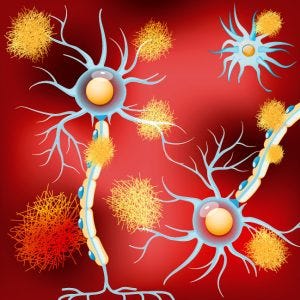Fighting Alzheimer’s Disease with a Breakthrough PeptideFighting Alzheimer’s Disease with a Breakthrough Peptide
April 13, 2020

https://stock.adobe.com
Even more so than cancer, Alzheimer’s disease is one disease that many people fear greatly. The thought of falling prey to the inevitable desecration of our own minds is something that makes even the bravest among us shudder. If we’re robbed of our sense of who we really are, we imagine, then we are doomed to live our last days without the dignity that defines us and that we hold most dear. The ultimate horror of the condition is that it is as indiscriminate, merciless, and devastating as a wind-swept wildfire.
So it is not surprising that a disease-modifying treatment for the condition has become a Holy Grail of sorts in the biotechnology industry. Alzheimer’s disease casts a shadow over many families. It seems that everyone is touched by it in one way or another. And it exacts a devastating financial toll on society, with Alzheimer’s patients needing around-the-clock care for an average of eight years. Some suffer for as long as 20 years.
The estimated cost for caring for Americans with Alzheimer’s and other dementias is well over a quarter of a trillion US dollars per year (1). And that figure doesn’t include unpaid caregiving. Alzheimer’s disease is ranked as the third leading cause of death of seniors in the United States, surpassed only by heart disease and cancer. Some six million Americans have become victims of the disease, a number that rises each year as lifespans increase with advancements in medical science.
Such unnerving considerations help explain why the capital markets are willing to rally behind companies with Alzheimer’s drug therapies in development. Investors react especially generously to positive clinical data from human clinical trials. Recently, several companies in this sector have seen their share prices surge higher.
This article first appeared in an eBook in February 2020. Click here to read it in its entirety: Peptide Therapies: Small Biomolecules Address Big Health Problems.
References
1 Preidt R. The High Costs of Alzheimer’s. HealthDay Reporter 20 March 2018; https://www.webmd.com/alzheimers/news/20180320/the-high-costs-of-alzheimers#1.
2 Prvulovic M. What Should Investors Think of Biogen’s Alzheimer’s Drug Candidate? The Motley Fool 31 October 2019; https://www.fool.com/investing/2019/10/31/what-should-investors-think-of-biogens-alzheimers.aspx.
3 Silver J. Emerging Treatments for Spinal Cord Damage. BioProcess Int. 17(9) 2019: 22–27.
4 Jefferson RS. New Alzheimer Treatment Could “Take the Breaks off the Body’s Repair Systems,” Allowing It to Repair Itself. Forbes 30 October 2019; https://www.forbes.com/sites/robinseatonjefferson/2019/10/30/new-alzheimer-treatment-could-take-the-brakes-off-the-bodys-repair-systems-allowing-it-to-repair-itself/#2c3e05a014a9.
Marc Davis is a financial analyst, commentator, and journalist. Follow him on Twitter @mldjournalist or LinkedIn (https://www.linkedin.com/in/marc-davis-ba4644174). For more information, contact Huitt Tracey in corporate communications at NervGen Pharma, Suite 1703, Three Bentall Centre, 595 Burrard Street, Vancouver, BC V7X 1J1; 1-604-537-2094; [email protected].
You May Also Like






